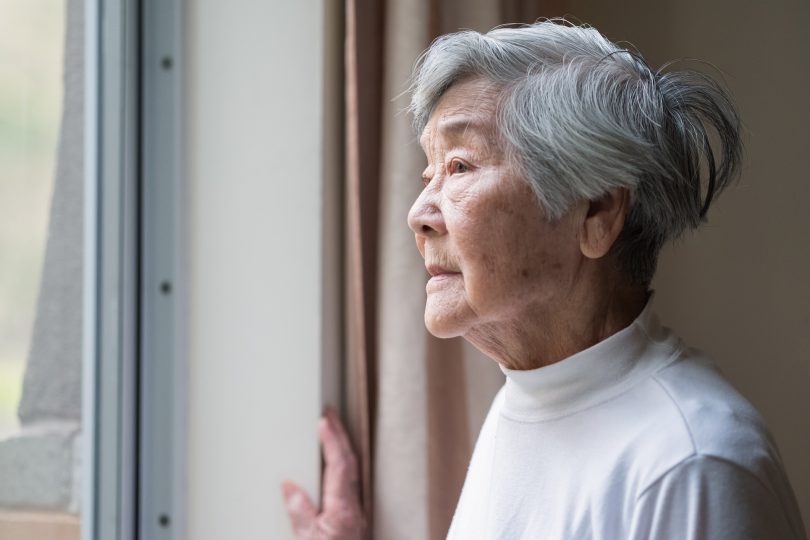
If an elderly person exhibits changes in social or family activity or avoids someone, these can be signs of abuse. Photo: Pamela Joe McFarlane.
Coercive control has been in and out of the spotlight for years. But discussions of this insidious and often unidentified pattern of subjugation often centre on domestic and Intimate Partner Violence (IPV), less so on its application to another vulnerable demographic – the elderly.
States and territories are beginning, in varying degrees, to consider what the criminalisation of coercive control would look like in their jurisdictions – a discussion Baker, Deane & Nutt (BDN) Lawyers solicitor Amber Lawrence welcomes.
“NSW and Tasmania have very strong views and discussions are being held in the ACT, too,” she says. “It will be very useful to have a solid definition established.”
However, Ms Lawrence foresees challenges and says lawmakers must carefully consider the nature, scope and implementation issues of this criminalisation.
“One of the biggest challenges in applying laws of this nature in actual litigation, due to the nature of this kind of abuse, will be evidence,” she says.
“It’s great that we’re discussing outlawing coercive control, but so much of it is psychological, silent and behind closed doors and, ultimately, the burden of proof is with the prosecution. In coercive control matters, showing evidence that the crime has happened could prove challenging.”
Ms Lawrence says she sees education and awareness playing a critical role in recognising and turning the tide on coercive control.
“Part of my role as a lawyer, especially when dealing with things such as wills and estates, is to ensure we’re meeting with elderly clients individually (on their own) to ensure they’re not being coerced into decisions,” she says.
“But it has to go beyond that because it’s hard to make important judgements based on one observable moment or interaction.
“Sometimes an adult child will bring their parents in for appointments, they could be in the waiting room and you’ll overhear them talking to their parents in a certain way. It’s almost as though they’re disciplining their parent.”
Ms Lawrence says these sorts of interactions, while seemingly benign, should prick up the ears of anyone with a duty of care.
“It’s not just lawyers that need to know what to look for – it’s bankers, doctors, first responders…” she says.

BDN Lawyers solicitor Amber Lawrence says if coercive control is criminalised, providing evidence in some cases may prove challenging. Photo: BDN Lawyers.
In broad strokes, coercive control is identified in patterns of behaviour that isolate or rob a person of independence or quality of life. In elder abuse, this can include denying access to phones, preventing socialisation, neglecting or withdrawing care, withholding necessities such as food, drink or medication or preventing access to equipment such as glasses or hearing or walking aids.
Council on the Ageing (COTA) CEO Ian Yates says commonly it can be implying loss of faculties without medical evidence, gaslighting and emotional threats.
“Studies have shown the most prominently widespread elder abuse is emotional abuse and a lot of that is about control. It’s often achieved by undermining and diminishing self-confidence,” he says.
“Use of blackmail like ‘you’re not going to see the grandkids’ is not uncommon.
“A very common occurrence is putting elderly family members into aged care facilities against their preference, even if they’re capable of living at home with support. It’s not hostile or overt or trying to steal something, but it’s a red flag.”

COTA CEO Ian Yates says in the absence of severe cognitive decline, the elderly should retain at least some of their agency. Photo: COTA.
Mr Yates says coercion of the elderly is usually motivated by control of resources.
“Often it’s not necessarily about ‘cleaning them out’, but getting them to subsidise you in some way,” he says.
“That might be living rent-free, gaining control over assets such as property or creating a dynamic that coerces them into, for example, providing a loan or business guarantee.”
But where there is no paper trail pointing to abuse, one challenge in criminalisation will be distinguishing where the appropriate relationship dynamic ends and coercive control begins.
“Unless we’re dealing with advanced loss of capacity or severe cognitive decline, the presumption ought always to be that the older person retains all or some of their agency. Not doing that crosses a fundamental line,” Mr Yates says.
With evidence and victim reports often problematic or non-existent, how do we spot coercive control of our elderly?
Australian Institute of Family Studies research director Dr Rae Kaspiew says a typical victim response to elder abuse is to avoid the perpetrator or even totally withdraw from social contact.
“So it’s important to look for signs of changes in social or family activity and if an older person is avoiding someone,” Dr Kaspiew says.
“Our study also showed higher levels of psychological distress among people who experience abuse, so it is important to watch out for signs of depression or anxiety.
“People should not be afraid to start a gentle conversation if they have concerns.”
If you are or know an older adult who may be a victim of abuse, visit Council on the Ageing (COTA) or Older Persons Advocacy Network (OPAN).















